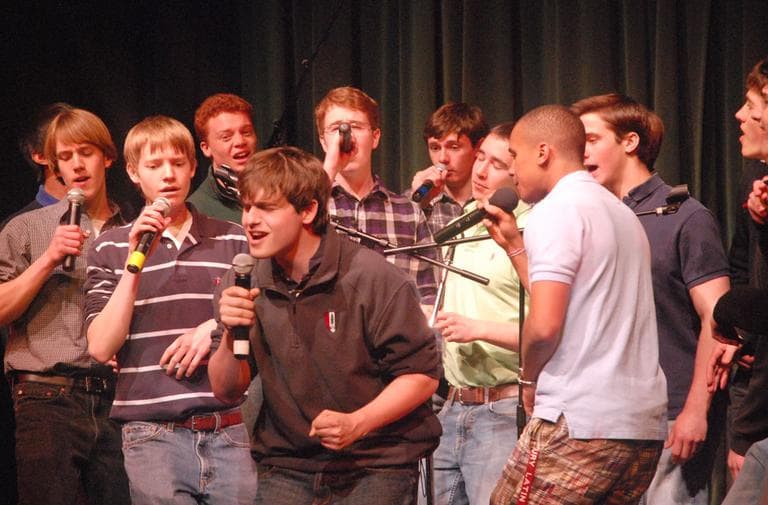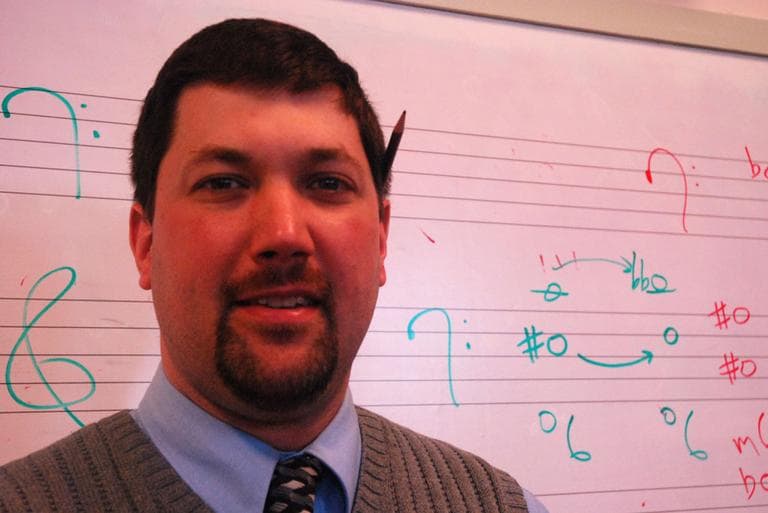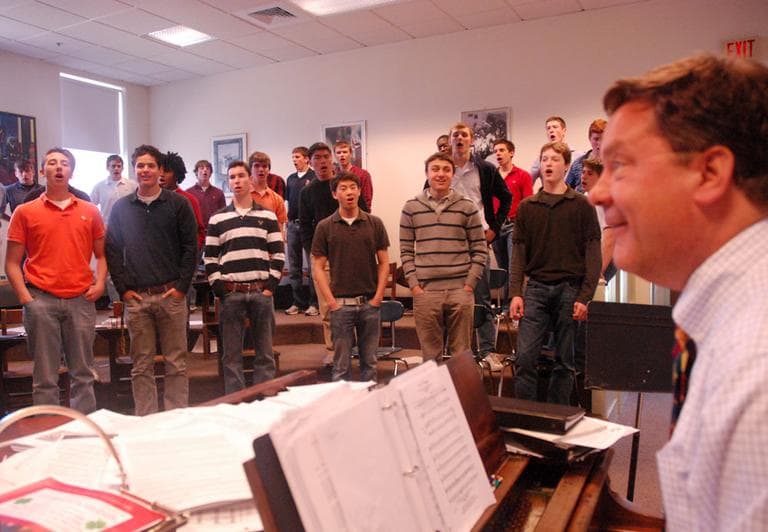Advertisement
Real Life 'Glee': Getting Jocks To Sing
Resume
Popular TV shows like “High School Musical” and “Glee” have helped make singing in school "cooler" for a lot of American kids. But it’s still tough to convince boys — especially athletic, adolescent boys — that it’s OK to belt it out.
At Roxbury Latin, an independent all-boys school in Boston, more than 50 percent of nearly 300 students sing. For them, the idea of being a baritone is just as cool as being a football player.
But how does the school pull this off, especially for boys growing up in a culture rife with testosterone-laced images and ideals of masculinity?
Take “Glee,” for instance. The quirky, dark comedy captures the joys of singing in school — but it also amps up the horrific agony that defines adolescence: the search for identity, peer pressure, the relentless drive to be popular. In “Glee,” singing does not boost your social capital.
At Roxbury Latin, an all-boys school in Boston, more than 50 percent of nearly 300 students sing. For them, the idea of being a baritone is just as cool as being a football player.
In one scene, the cheerleading coach makes something clear to the director of the glee club: “High school is a caste system. Kids fall into certain slots: your jocks and your popular kids up in the penthouse. The invisibles and the kids playing live-action druids and trolls out in the forest, bottom floor."
Then the glee club director asks, “And where do the glee kids lie?”
“Sub-basement,” she replies.
The show brings back memories for Rob Opdycke, director of music at Roxbury Latin.
“'Glee' definitely reminds me more of the drama and social chaos of my own high school experience than it does of anything I see on a day-to-day basis here, so it’s kind of a nostalgia piece for me,” he said.
It takes Opdycke back to his school days at North Attleboro High. He graduated in 1995 and said he was a decent athlete. But he excelled in the music department, where he was one of only five boys in a 30-person chorus.
“I actually didn’t mind the ratio,” he recalled with a laugh.
But it also meant something else: "I would never be able to ask a cheerleader out on a date, I would never be able to feel as if I had the same social status as the captain of the football team,” he said.
So there it is — the enduring conflict between art and sport — and all the stereotypes that come with it.
But things are different for the boys at Roxbury Latin.

Senior Josh Rivers captains the football team. He plays basketball and runs track. And yes, he sings, with the Latonics, a 15-boy A cappella group lead by Opdycke.
Beneath spotlights in the school’s theater, I watched Opdycke finesse the boys’ sound as they rehearsed for an upcoming performance. They were really into it, but Rivers, a handsome senior, admitted it’s taken him a long time to let loose on stage. His early quandary mirrors a storyline in “Glee” featuring a football player who worries what singing in a club could to do to his reputation.
"That was what I was facing,” Rivers said, “I was wondering how much, in terms of popularity, how it would affect me, like, what would people think of me if I’m singing like this? But then once you start doing it you realize those stereotypes and all sorts of obstacles are just completely false.”
Rivers says his teacher’s passion and attitude convinced him to join chorus in the eighth grade. Opdycke treats the school’s singing groups like sports teams, and he’s the coach.
"It can be a goal-oriented activity, just like scoring points in a sports competition can be. They actually can use masculine instincts, they can use the idea of competitiveness and drive and 'we shall be victorious,' ” Opdycke said quite forcefully. “They can use that in the arts, as well. I try to tap into that.”
Nelson Tamayo, another senior, said that while Opdycke's tactics work, it also helps that there aren't any girls around.
“I feel like being in an all-boy environment kind of allows us to be a bit more vulnerable,” he admitted, “maybe whereas if we were singing in a co-ed environment there might be a greater stigma against singing, or it would be seen as more effeminate, or people would maybe be turned off by that.”

Roxbury Latin Headmaster Kerry Brennan calls the all-boys school “a safe place” — and yes, he sings too, in an all-male A cappella group called Sly Voxes.
“I used to be a true tenor — a second tenor — but I’m describing myself as a whiskey baritone these days,” he told me with a warm laugh.
Brennan has been instrumental in nurturing the long-standing singing tradition at Roxbury Latin. He’s been there since 1978 and was music director before becoming headmaster. But Brennan still teaches glee club.
The class includes the school’s youngest students — seventh- and eighth-graders. In class they look a little awkward, shifting on their feet, some sing through braces. It's a tender time, Brennan said. But he believes there are many ways to be a boy. This weekend at graduation, he and music director Rob Opdycke will watch as young men who once feared singing move on.
“It certainly warms my heart every September, when I find out and get emails from alumni who have told me they got into such and such a group in college,” Opdycke said.
But if the boys don’t do it in a group, he’s confident they’ll feel free to sing their hearts out in the car — or the shower — for the rest of their lives.
This program aired on June 3, 2011.
